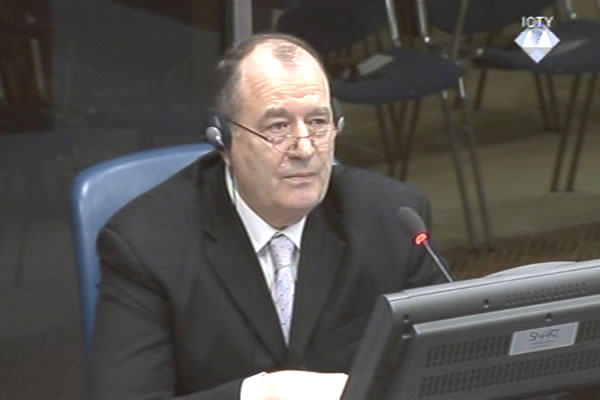Home
INVESTIGATION THAT COST WITNESS HIS JOB
In a bid to prove that Radovan Karadzic and his defense witness Mico Stanisic were close during the war, the prosecution called evidence of their friendship and cooperation, which lasted from 1991 until 1994, when the police minister dared to launch an investigation into the president’s financial affairs. He was soon dismissed from his post
 Mico Stanisic, witness at the Radovan Karadzic trial
Mico Stanisic, witness at the Radovan Karadzic trial At the beginning of the cross-examination of Mico Stanisic, former Bosnian Serb police minister, prosecutor Matthew Olmsted recalled that, according to the findings in Stanisic’s trial judgment, the witness had been a member of the same joint criminal enterprise as the accused Radovan Karadzic. According to the trial judgment, sentencing Stanisic to 22 years in prison, the witness and Karadzic worked side by side to implement the same goal: the expulsion of Muslims and Croats from the parts of BH Serbs claimed for themselves. Stanisic was adamant yesterday that he and Karadzic had barely kept in touch during the war.
The prosecutor showed a conversation intercepted on 12 June 1991: Karadzic called Stanisic, who was the chief of the Sarajevo SUP at the time, on his home phone. Karadzic asked Stanisic about the health of his son and urged him to visit him at home. In the spring of 1992, the witness became the police minister as an SDS appointee. When Stanisic was removed from his post, he became Karadzic’s advisor before he was reinstated as minister in 1994. In Stanisic’s view, this did not constitute proof of any particular closeness between them. Before the war, presidents of all the political parties called him on his home phone. He was appointed minister because of his professionalism, Stanisic claimed. As he explained, he was appointed advisor ‘merely to maintain continuity of service’.
In mid-1994 Stanisic dared to launch an investigation into Radovan Karadzic’s and Momcilo Krajisnik’s financial shenanigans. On their orders, Stanisic was quickly fired from his job. According to the prosecutor, this is proof of the influence wielded by the accused. The witness agreed with the suggestion, confirming the claim he had made in his statement to the OTP investigators in 2007, that Karadzic and Krajisnik ‘designed the SDS policy’ and that the deputies couldn’t influence them.
Stanisic claimed that the MUP could barely function in the first year of the war, when most of the crimes he was convicted of and Karadzic is charged with were actually committed. The prosecutor confronted him with an interview in the weekly Javnost from October 1992, where Stanisic claimed that the police ministry was a ‘centralized organ where no one has ever refused to comply with any of my orders’. Stanisic now says he ‘deliberately’ exaggerated the situation because he wanted his threats of arrest to the Serb criminals to be more credible.
The prosecutor recalled Stanisic’s speech in the Assembly on 23 November 1992, when he said that in the beginning ‘thieves and criminals’ were allowed to join the reserve police to defend the Serb people in BH, and admitted that it had been his mistake. The witness interpreted his words differently today, saying that there were just a few problematic police officers in some stations. They had been given the job in contravention of his instructions.
The prosecutor put it to Stanisic that the ‘thieves and criminals’ in the police were used to detain non-Serbs in prison camps throughout Republika Srpska. The witness claimed that he learned about it in July 1992 and immediately issued an order to treat prisoners in accordance with the law. The prosecutor noted that only one such order was issued. All the other documents Stanisic issued speak about the investigations of the incidents in which prisoners had been killed and abused, but not of closing down the prison camps. The witness replied that he had never issued any decisions to establish any prison facilities, and consequently he couldn’t close them down. Stanisic shifted the blame on the army and the local Crisis Staffs. In Stanisic’s words, he did everything to ‘distance’ the police from that. Mico Stanisic will continue his evidence tomorrow.
Linked Reports
- Case : Karadzic
- 2014-02-03 IF BOSNIAN SERB POLICE HAD BEEN PART OF INTERPOL…
- 2014-01-30 INCIDENT IN HAMBARINE – CAUSE OR PRETEXT FOR CRIMES?
- 2014-01-30 WITNESS DOESN’T KNOW WHO KILLED VILLAGERS, BUT KNOWS THEY ‘RAN AMOK’
- 2014-02-05 POLICE FIRST ARMED CRIMINALS THEN HAD TO FIGHT THEM
- 2014-02-06 JOURNALIST RENOUNCES HIS WARTIME TEXTS
- 2014-02-06 CRIMES WERE COMMITTED BY POLICE OFFICERS AND ‘CONSCIENCELESS INDIVIDUALS’
